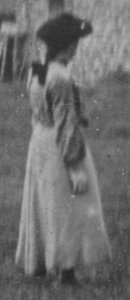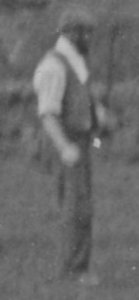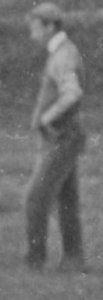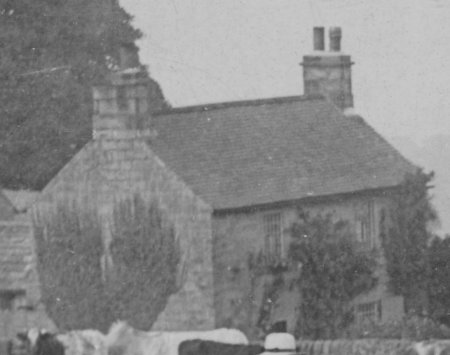Article reproduced from
Derbyshire Advertiser 6 Jan 1912
New Barn Farm - Alderwasley
| |
Sometime ago, a "sketch" was executed of Mr T
Sandars' farm, Berry Hill, Alderwasly. Upon the
information being received that his brother, Mr J E
Sandars, was also a successful farmer of this district,
the resolve was made to approach him also, and after
many delays of other engagements, the resolve was
carried into effect.
Apart from the interest of the farm, the visit was
well worth making by reason of the lovely bit of country
through which it was reached. Taking the right-hand or
upper road in Alderwasley Park, the road is bounded by a
stately line of well-grown forest trees. An inconspicuous
gate in the wall admits to the cart road leading to the
farm. This gate, well hung, and with easy-working latch,
gives promise of the good order to be expected at the
farm, gates being an excellent criterion of the capability
of a farmer. If hanging out of the true balance, with
broken bars and awkward latches, it would appear that
they argue lack of energy rather than lack of ritches.
For these repairs are not really beyond the scope
of a capable amateur. It is, however, noted that in this
district many farmers and their sons are not only amateur
joiners, but even very fair builders and mechanics.
Though the farm stands high, it is some-what
sheltered by the rising ground above, and by the imposing
shade of the well-grown symmetrical sycamores. If one
takes, as is usual amongst agriculturists, the timber as a
test of the goodness of the soil, this neighbourhood is
fortunate.
Mr J E Sandars has now for twenty-three years
farmed 97 acres on the Alderwasley estate, the present
member of the Hurt family now owning it being Mr F C
A Hurt, of Alderwasley Hall. A kindly welcome is given by
Mrs Sanders, who, silver-haired, and still bonny, must
have been more than somewhat
of a beauty in her youth.
The winters of
Derbyshire have dealt kindly
with her, in spite of the fact
that she is a native of a more
southern county, being proud to
claim Startford-upon-Avon as
her birthplace. Surrounding the
house is a delightfully wild little
garden, every inch of which on
our visit was crowded with an
infinite variety of flowering
plants, chiefly reminiscences of
visits. Mrs Sandars is evidently
a fortunate gardener, for all the
specimens have struck root and
flourish exceedingly.
Entering the house
under the porch, great comfort
is to be found in a small space,
the thick wall affording the
protection necessary on these
Derbyshire moors, when the
furies of the winter wind are let loose, and windows rattle
and boughs strain and moan in the fierce blasts. All is
very compact, a cosy little kitchen, a sitting-room of very
fair size, and a dainty little pantry, which Mrs Sandars
declares to be too small - it certainly, though arranged
with the utmost neatness, appears somewhat crowded
with good cheer.
The sale of milk forms perhaps the principal,
though not the sole, business of the farm, the purchaser
having been for many years Mrs Sheldon, of Duffield.
Churns made by Messrs D Marsden and Son, Duffield,
are used, and the milk is sent everyday to Whatstandwell
Station, and when there is a small surplus Mrs Sandars
makes a little butter for home consumption and for a few
favoured customers.
Not far from the house is the milk cooling shed,
also a compact little place, and fitted by Mr Sandars with
a Watson's cooler, which, though occupying small space
offers a large cooling surface. Mr Sandars keeps a good
herd of dairy shorthorns, giving his preference to red
cows: he declares that he has never in his life had any
luck with a black animal, though animals of this colour
thrive apparantly on many farms in the district, and
certainly add a picturesque touch to the landscape.
The farm lying on the gritstone renders it suited
to Shropshire sheep, which thrive here amazingly. Mr
Sandars considers this breed the most satisfactory for
both quantity and quality of mutton. With his pigs, too,
Mr Sandars is extremely fortunate, having over 20
healthy promising juveniles at various stages of growth.
Although the pig is considered a profitable animal, he is
not the source of so large a revenus to the breeder as
might be supposed, for at least 50 per cent of the profits
fall into the hands of the middleman. Every housewife
knows that good bacon cannot be purchased
under 10d. and even more per lb., but the
farmer is fortunate if he receives half that sum.
Co-operation amongst farmers has
been suggested, but does not appear to gain
wide favour. Would it not be possible for
some modified system to be introduced
whereby two or three farmers of the
district should contract to supply one or
more of the larger local shops direct at a
fixed price? The present extensive sale of
milk on these lines appears to work to the
satisfaction of both sides.
A visit to the stable finds at home
"Fan", an irongrey three-year-old filly, who,
in spite of her youth, has already done good
work. In the next stall is "Bonny", an aged
strawberry roan, and, beyond "Dick", a
handsome chestnut, whose daily work is to
take the milk quickly to the station. During
Mr Sanders ownership of him, "Dick" has never made a
mistake, which is a good deal to say when it is a question
of these hills and difficult Derbyshire roads, where even
the best horse may on occasion be devotionally inclined.
A very important department on this farm is the
poultry, the charge of Mr Sandars two daughters - his
only children. Turkeys do well. Aylesbury ducks, too, are
reared, with a large number of fowls of varios kinds.
Mr Sandars is very fairly satisfied with last
year's harvest - the house and buildings, in fact, being
nearly hidden from view on one side by several large well-
thatched stacks. The hay crop has been very good, and
the oats, of which he grows some fourteen acres, well
ripened and well got, though rather lighter than those of
his neighbours who farm on the limestone, favoured by a
dry summer. The same remarks apply to wheat, of which
Mr Sandars grows several acres.
One very important animal must not be forgotten.
"Bob", an old English sheep dog, which does duty as a
watch-dog outside the gate. The zeal with which "Bob"
performs his duties knows no bounds. He fairly whirls at
the end of his chain, barking vociferously the while at
every fresh comer, and yet off the chain "Bob" is one of
the mildest animals in existence.
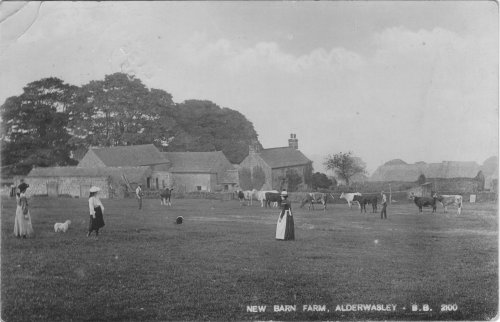
 Click on photo for enlargement (on CD only)
Have any more information about this photo?
Please e-mail the author on:
Click on photo for enlargement (on CD only)
Have any more information about this photo?
Please e-mail the author on:

 Click on photo for enlargement (on CD only)
Have any more information about this photo?
Please e-mail the author on:
Click on photo for enlargement (on CD only)
Have any more information about this photo?
Please e-mail the author on:

